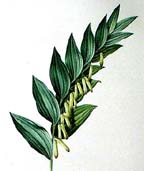 Solomon's Seal
Solomon's Seal
Polygonatum
odoratum
This herb gets its name from the fact that when the plant dies back in the fall and the stalk falls from the root, the scar left behind is shaped like a Star of David, also known as the Seal of Solomon. It is said that King Solomon, renowned not only for being wise but for sorcery, put his seal on this plant to indicate its worth. Thus, this magick herb can be helpful for making difficult decisions and to increase wisdom. You can carry it as a protective amulet, use it in exorcism, place it on the altar to help ensure the success of a work, or burn it when consecrating an athame. An infusion of the roots is sprinkled about to turn away evil. The root has also been used as a means of calling the Elementals. It is associated with the Fall equinox and is identified with Saturn.. The Cherokee censed their homes with this root (it smells like fresh popcorn). The Menominee smudged with it to revive unconscious patients.
Solomonís Seal is a hardy perennial in Zones 4 to 9. It can grow to 18-24 in/45-60 cm tall, gracefully drooping toward its tubular greenish-white flowers, which hang from the underside of the stem. Like its close relative of Lily of the Valley, this dainty plant blooms in spring through midsummer, then its flowers are replaced by small bluish-black seed-filled berries in August through early fall. The roots are thick and white and, if not hindered by other roots, can multiply to form quite dense colonies. It is a wonderful addition to any cottage garden (Faerie gardens too!) and does well in shady areas with little-to-no tending.
If you intend to harvest the root, dig it in autumn from a mature plant and allow three to seven days to dry in a well-ventilated area, or use a dehydrator. Do not dry in an oven or microwave. After the root it is dry (the largest root will snap instead of bending), store it in a dry area inside a paper bag or cardboard box until you're ready to use it.
How to Grow Solomonís Seal: Please note that these seeds, like those of many rare and woodland flowers, have built-in dormancy for self-protection and must be cold stratified. Some seeds will germinate after the initial warm/cold/warm period, while others will require up to 4 years of these alternating conditions to germinate. Check out the Making Winter page to learn more.
In spring, sow seeds 1/4 in deep in flats, or shallow containers, moisten, and place into the refrigerator. If fridge space is at a premium, mix the seeds with a bit of wetted vermiculite in a small jar or medicine bottle, or use the wet paper towel in a baggie method. Leave the seeds in fridge for three weeks. After three weeks, sink the flats/containers into the ground in a shady area, cover them with a glass or plastic covering and keep an eye on them to ensure the soil stays moist (not sopping). When seedlings emerge, transplant them to their permanent location spacing 18in/45cm apart. If using vermiculite or a baggie, sow the seeds directly, barely covering them. Cold-stratified seeds germinate better when they get light. This seed is also a good candidate for the soaking method - soak seeds in cold water in the fridge for two weeks, changing for fresh water daily. Take out and plant. Alternatively, direct sow these seeds outside in the fall.
Solomonís Seal prefers shady areas or dappled shade, and loamy, sandy, clay soils that are well drained. If it has too much sun or the soil is too dry, this plant won't bloom.
|
Solomon's Seal
Polygonatum odoratum
10 seeds $3.75

Buy the Root (dried)
Uses in Witchcraft & Magick:
Decision-Making
Protection Spells
Wisdom
Exorcism
Consecration
Saturn Herb
© 2023-2024 Alchemy Works;
No reproduction without permission
|